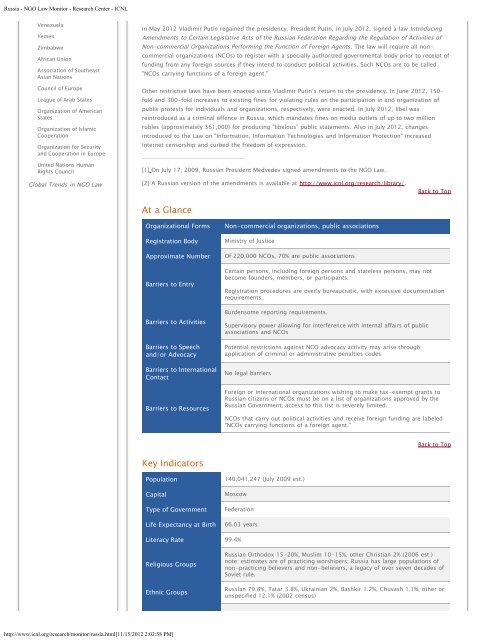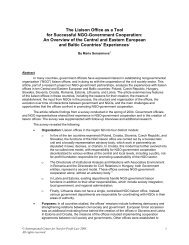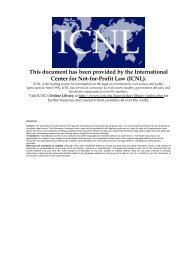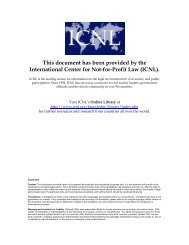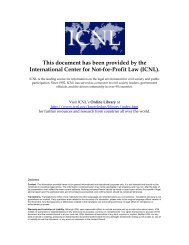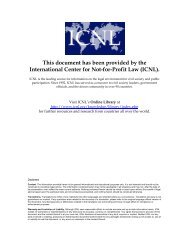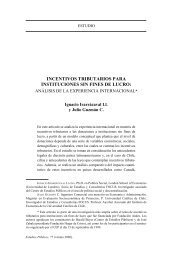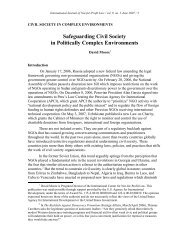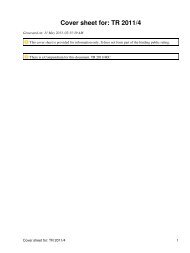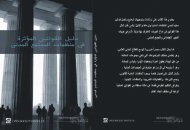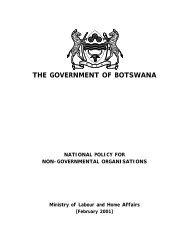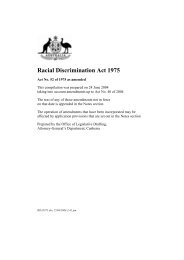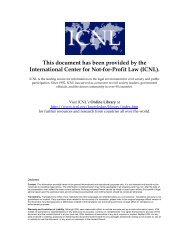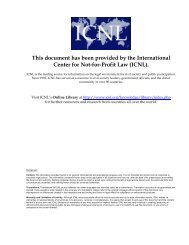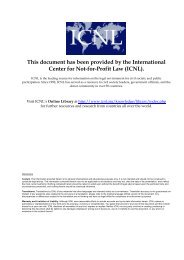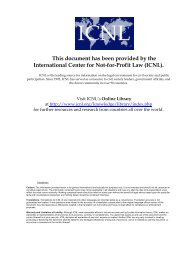Russia - NGO Law Monitor - Research Center - ICNL
Russia - NGO Law Monitor - Research Center - ICNL
Russia - NGO Law Monitor - Research Center - ICNL
Create successful ePaper yourself
Turn your PDF publications into a flip-book with our unique Google optimized e-Paper software.
<strong>Russia</strong> - <strong>NGO</strong> <strong>Law</strong> <strong>Monitor</strong> - <strong>Research</strong> <strong>Center</strong> - <strong>ICNL</strong><br />
Venezuela<br />
Yemen<br />
Zimbabwe<br />
African Union<br />
Association of Southeast<br />
Asian Nations<br />
Council of Europe<br />
League of Arab States<br />
Organization of American<br />
States<br />
Organization of Islamic<br />
Cooperation<br />
Organization for Security<br />
and Cooperation in Europe<br />
United Nations Human<br />
Rights Council<br />
Global Trends in <strong>NGO</strong> <strong>Law</strong><br />
http://www.icnl.org/research/monitor/russia.html[11/15/2012 2:02:58 PM]<br />
In May 2012 Vladimir Putin regained the presidency. President Putin, in July 2012, signed a law Introducing<br />
Amendments to Certain Legislative Acts of the <strong>Russia</strong>n Federation Regarding the Regulation of Activities of<br />
Non-commercial Organizations Performing the Function of Foreign Agents. The law will require all noncommercial<br />
organizations (NCOs) to register with a specially authorized governmental body prior to receipt of<br />
funding from any foreign sources if they intend to conduct political activities. Such NCOs are to be called<br />
"NCOs carrying functions of a foreign agent."<br />
Other restrictive laws have been enacted since Vladimir Putin’s return to the presidency. In June 2012, 150fold<br />
and 300-fold increases to existing fines for violating rules on the participation in and organization of<br />
public protests for individuals and organizations, respectively, were enacted. In July 2012, libel was<br />
reintroduced as a criminal offence in <strong>Russia</strong>, which mandates fines on media outlets of up to two million<br />
rubles (approximately $61,000) for producing “libelous” public statements. Also in July 2012, changes<br />
introduced to the <strong>Law</strong> on "Information, Information Technologies and Information Protection" increased<br />
Internet censorship and curbed the freedom of expression.<br />
[1] On July 17, 2009, <strong>Russia</strong>n President Medvedev signed amendments to the <strong>NGO</strong> <strong>Law</strong>.<br />
[2] A <strong>Russia</strong>n version of the amendments is available at http://www.icnl.org/research/library/.<br />
At a Glance<br />
Organizational Forms Non-commercial organizations, public associations<br />
Registration Body Ministry of Justice<br />
Approximate Number Of 220,000 NCOs, 70% are public associations<br />
Barriers to Entry<br />
Barriers to Activities<br />
Barriers to Speech<br />
and/or Advocacy<br />
Barriers to International<br />
Contact<br />
Barriers to Resources<br />
Key Indicators<br />
Certain persons, including foreign persons and stateless persons, may not<br />
become founders, members, or participants.<br />
Back to Top<br />
Registration procedures are overly bureaucratic, with excessive documentation<br />
requirements.<br />
Burdensome reporting requirements.<br />
Supervisory power allowing for interference with internal affairs of public<br />
associations and NCOs<br />
Potential restrictions against NCO advocacy activity may arise through<br />
application of criminal or administrative penalties codes<br />
No legal barriers<br />
Foreign or international organizations wishing to make tax-exempt grants to<br />
<strong>Russia</strong>n citizens or NCOs must be on a list of organizations approved by the<br />
<strong>Russia</strong>n Government; access to this list is severely limited.<br />
NCOs that carry out political activities and receive foreign funding are labeled<br />
"NCOs carrying functions of a foreign agent."<br />
Population 140,041,247 (July 2009 est.)<br />
Capital Moscow<br />
Type of Government Federation<br />
Life Expectancy at Birth 66.03 years<br />
Literacy Rate 99.4%<br />
Religious Groups<br />
Ethnic Groups<br />
Back to Top<br />
<strong>Russia</strong>n Orthodox 15-20%, Muslim 10-15%, other Christian 2% (2006 est.)<br />
note: estimates are of practicing worshipers; <strong>Russia</strong> has large populations of<br />
non-practicing believers and non-believers, a legacy of over seven decades of<br />
Soviet rule.<br />
<strong>Russia</strong>n 79.8%, Tatar 3.8%, Ukrainian 2%, Bashkir 1.2%, Chuvash 1.1%, other or<br />
unspecified 12.1% (2002 census)


